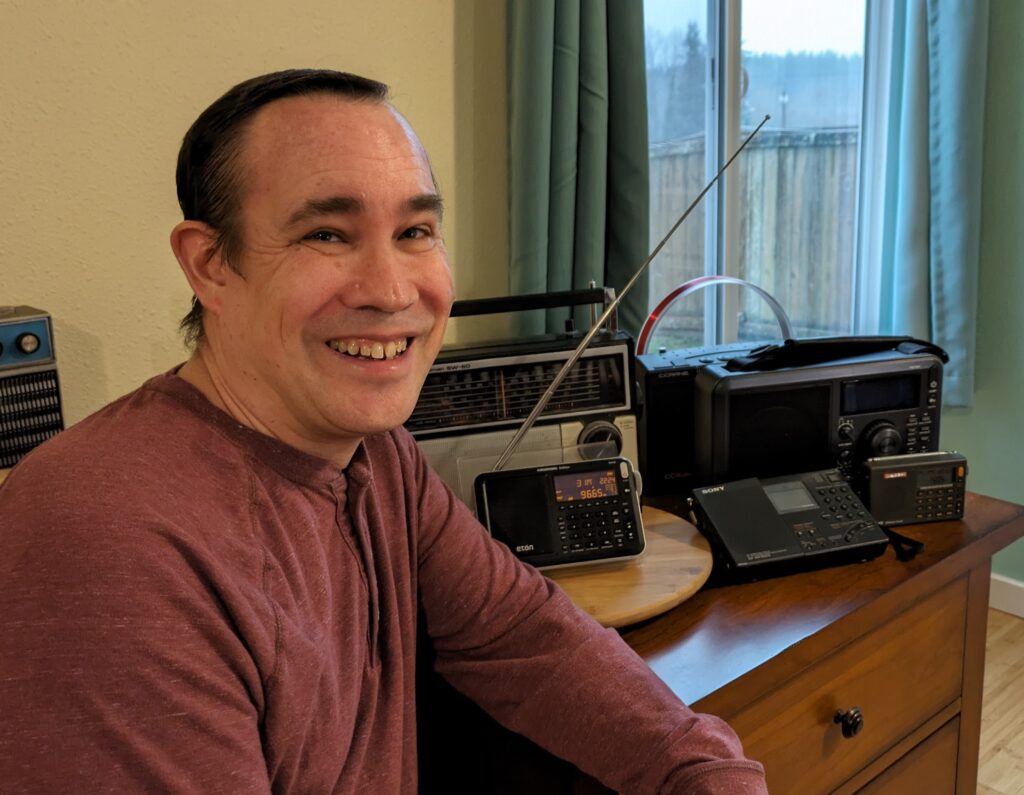When the Top 10 DX of the Year 2023 Contest results were posted by the Top DX Radioclub on January 24, 2024 — https://swling.com/blog/2024/01/results-top-10-dx-of-the-year-2023/ — I noticed that Eric Fetters-Walp had placed seventh overall and #1 in North America and #1 in the USA.
I was curious how he had achieved his results, so I contacted him, and he agreed to an interview.
SWLing: Tell me a bit about your history as a SWL.
EFW: When I was about 8 years old in the late 1970s, my Dad and I built a VHF airband radio kit; we were under one of the flight paths for LAX in the suburbs east of Los Angeles. I was into music on AM at the time, especially on 1020 KTNQ, a top 40 station back then.
By then time I was about to turn 13, we were living outside Seattle, and I wanted to upgrade to a better VHF radio. I bought a Realistic Patrolman SW-60, a big analog-dial radio with AM/FM/VHF/UHF and SW. I remember I had to earn the money doing chores, though my dad chipped in the last five bucks.
I brought it home and, while playing around with it, switched it to the shortwave band. I had never heard of shortwave before, but I almost immediately heard HCJB in Ecuador, and I was hooked. I was already a geography geek, so I’d listen while looking through a world atlas book I had. Even today, above my work desk, I have a map on cork board with pins in it.
I got really into collecting QSL cards from all over the world as I listened all through the rest of the 1980s. Shortwave really helped me become a news hound as I thought about studying journalism, and all the Cold War-era stations fed my fascination with history. For my college essay, I wrote about how I felt that being a shortwave listener as a teen helped me learn about the world.
I didn’t have an outdoor antenna at my parents’ house growing up, and I didn’t own a radio with a digital display until the 1990s. So, listening in that era taught me to be super patient, to sometimes just park on a frequency looking for signal to fade in.
By the early 1990s, as I was starting my career, working as a reporter and editor at small-town newspapers, I mostly fell out of SWLing. Then, I got married and my wife and I had three kids. My oldest is now 21 and my youngest is 14, so I had started to have some extra time again just a few years ago.
In 2018, I dusted off my old Sony ICF-SW7600G, and I had a little Kaito radio my dad gave me, and I started listening again. A little later on, I acquired the Eton model that became the current Elite Executive. And I strung up a wire on the backyard fence about 60 feet. I have an advantage: our backyard backs up to a wide-open middle school athletic field, which seems advantageous for cutting down the noise. I also have an MLA 30+ loop, and I’ve just started playing with an SDR dongle for hunting signals.
SWLing: What about the contest?
EFW: The rules are you record your best 10 catches during the month of December; they all must be in different countries. The scoring is complicated, but basically you are trying to hear the lowest-power station from the farthest distance. However, no clandestines, no pirates, no military stations, etc.
The first year I entered was 2018 after I read about it on The SWLing Post. I was surprised to do relatively well.
The past few years, my strategy has basically been to map out a list of target stations and then try to catch as many as I can. I started early in this latest contest, and that’s good thing; reception was pretty bad the second half of month. My goal’s always to make a good showing and just not finish last.
In the first week of December, LRA36 from Antarctica could be heard; 300 watts, and that was a huge addition to my points (I checked with the contest organizers to make sure it counted). I also logged Rádio Clube do Pará on 4885 in Brazil, which comes in pretty regularly here, and worked down the rest of my list.
SWLing: Do you have any advice for SWLs?
EFW: Even if you don’t have the most expensive equipment, so much depends on getting an antenna outside—even if it hangs only 6 feet off the ground as mine does.
In addition, a key to success is a willingness to be patient. I listen to relax and try not to be frantic about it. Since I’ve started SWLing again, I have logged nearly 70 countries by doing just that. Also, while I feel like I’m pretty experienced now, I’m always learning from others in this hobby. There are folks out there who are just great DXers, and I’m still reading their tips online to learn more.
Click here to check out Eric’s 2023 Top 10 DX of the Year Notes/Logs (Google Sheets).

